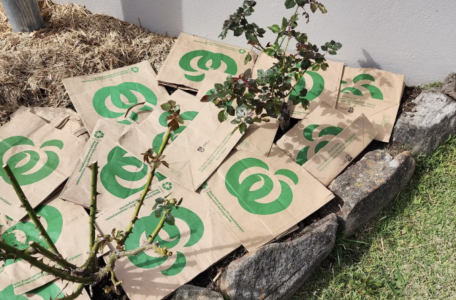Discover the Genius Hack Woolworths Shoppers Swear By to Fix a Frustrating Home Issue – It’s a Complete Game-Changer!
By
Seia Ibanez
- Replies 8
As we all know, the little things in life can often make the biggest difference, especially when it comes to household management. For our savvy seniors who have seen trends come and go, the recent shift by Woolworths and Coles to phase out single-use plastic bags in 2023 has been a significant change. While this move is a step forward for environmental sustainability, it has left many shoppers with a new conundrum: what to do with the growing pile of paper bags accumulating at home after each grocery delivery.
But, as it turns out, our resourceful community has come up with some ingenious solutions to this common household problem. It's the kind of practical wisdom that comes with experience, and it's a testament to the creativity and environmental consciousness of today's consumers.
Kath Brown, a mum and a member of a popular Facebook group, sparked a lively discussion when she shared her own lightbulb moment regarding the surplus of Woolies paper bags. She reminisced about how, if her children were still young, she would have repurposed the bags for their art projects. 'There’s soooo much paper there in all those bags, they could also colour it in to wrap birthday and Christmas gifts in. Food for thought!' she mused.
The response was overwhelming, with hundreds of comments pouring in from other shoppers who had found innovative uses for the bags. Some of the standout ideas included using them as cat litter liners, fire starters, and even as green waste collectors for composting. Others suggested donating them to charities, which is a wonderful way to give back to the community while also reducing waste.
One particularly clever use that caught our attention was from Alicia Grills, who uses Woolworths paper bags as weed mats in her garden. This age-old gardening trick involves laying the paper bags on top or underneath the soil to prevent weeds from sprouting. Alicia's approach is eco-friendly and practical, as the minimal dye in the paper bags means they're not only good for the soil but also decompose over time.
For those with a green thumb, Alicia recommends placing a layer of paper bags around your plants before mulching. Wet the bags down to keep them in place, then top with a layer of mulch. She also suggests using them at the bottom of pot plants before adding soil, which can help with drainage and weed control.
Another inspiring story comes from Bec Christo, who owns a local baby shop called Absolute Baby. She and her twin daughters, who are learning about the importance of recycling and environmental stewardship, have found a way to incorporate Woolies bags into their business model. By reusing the supermarket bags instead of buying new ones, they keep overheads down and reinforce the message of sustainability to their customers.
While these anecdotes are heartwarming and inspiring, it's important to address the environmental impact of paper bag use. Nina Gbor, a sustainability educator and consultant, points out that paper bags are not without their own environmental challenges. They require more water to manufacture than plastic bags and produce more greenhouse gas emissions. Additionally, the production of paper bags contributes to deforestation and can have detrimental effects on wildlife.
Despite these concerns, the reuse of paper bags is a positive step towards reducing waste. However, Gbor emphasizes the importance of using reusable cloth bags made from natural materials like hemp, bamboo, or cotton. She suggests that supermarkets could implement a system where customers can borrow and return reusable cloth bags, thus keeping them in circulation and out of landfills.

In conclusion, the transition from plastic to paper bags has opened up a new avenue for creativity and environmental responsibility. The stories shared by Woolworths shoppers are not just about finding a 'no brainer' solution to a household problem; they're about a community coming together to share ideas and practices that benefit us all. So, next time you're left with a stack of paper bags, remember that with a little ingenuity, they can be transformed into something useful and eco-friendly. And who knows, you might just come up with the next genius hack that will have everyone talking!
But, as it turns out, our resourceful community has come up with some ingenious solutions to this common household problem. It's the kind of practical wisdom that comes with experience, and it's a testament to the creativity and environmental consciousness of today's consumers.
Kath Brown, a mum and a member of a popular Facebook group, sparked a lively discussion when she shared her own lightbulb moment regarding the surplus of Woolies paper bags. She reminisced about how, if her children were still young, she would have repurposed the bags for their art projects. 'There’s soooo much paper there in all those bags, they could also colour it in to wrap birthday and Christmas gifts in. Food for thought!' she mused.
The response was overwhelming, with hundreds of comments pouring in from other shoppers who had found innovative uses for the bags. Some of the standout ideas included using them as cat litter liners, fire starters, and even as green waste collectors for composting. Others suggested donating them to charities, which is a wonderful way to give back to the community while also reducing waste.
One particularly clever use that caught our attention was from Alicia Grills, who uses Woolworths paper bags as weed mats in her garden. This age-old gardening trick involves laying the paper bags on top or underneath the soil to prevent weeds from sprouting. Alicia's approach is eco-friendly and practical, as the minimal dye in the paper bags means they're not only good for the soil but also decompose over time.
For those with a green thumb, Alicia recommends placing a layer of paper bags around your plants before mulching. Wet the bags down to keep them in place, then top with a layer of mulch. She also suggests using them at the bottom of pot plants before adding soil, which can help with drainage and weed control.
Another inspiring story comes from Bec Christo, who owns a local baby shop called Absolute Baby. She and her twin daughters, who are learning about the importance of recycling and environmental stewardship, have found a way to incorporate Woolies bags into their business model. By reusing the supermarket bags instead of buying new ones, they keep overheads down and reinforce the message of sustainability to their customers.
While these anecdotes are heartwarming and inspiring, it's important to address the environmental impact of paper bag use. Nina Gbor, a sustainability educator and consultant, points out that paper bags are not without their own environmental challenges. They require more water to manufacture than plastic bags and produce more greenhouse gas emissions. Additionally, the production of paper bags contributes to deforestation and can have detrimental effects on wildlife.
Despite these concerns, the reuse of paper bags is a positive step towards reducing waste. However, Gbor emphasizes the importance of using reusable cloth bags made from natural materials like hemp, bamboo, or cotton. She suggests that supermarkets could implement a system where customers can borrow and return reusable cloth bags, thus keeping them in circulation and out of landfills.
Key Takeaways
- Woolworths and Coles customers are finding innovative ways to reuse paper bags following the phase-out of single-use plastic bags.
- Suggestions for repurposing include using them as cat litter liners, fire starters, wrapping for gifts, weed mats in gardens, and donation to charities.
- An environmental expert highlights the misconception that paper bags are better for the environment, noting they come with their own challenges such as increased water usage, higher greenhouse gas emissions, and deforestation.
- The expert proposes that supermarkets should provide reusable cloth bags that customers can return, creating a system that reduces waste and prevents bags from going to landfill.
In conclusion, the transition from plastic to paper bags has opened up a new avenue for creativity and environmental responsibility. The stories shared by Woolworths shoppers are not just about finding a 'no brainer' solution to a household problem; they're about a community coming together to share ideas and practices that benefit us all. So, next time you're left with a stack of paper bags, remember that with a little ingenuity, they can be transformed into something useful and eco-friendly. And who knows, you might just come up with the next genius hack that will have everyone talking!








